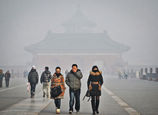
Skyrocketing housing prices have yielded considerable profits to developers, speculators and local governments that depend on transfer of land-use rights for a high percentage of their revenues. No wonder, some people's wealth has increased at an astonishing pace within a few years.
But in a zero-sum housing market, the drastic rise in some people's wealth and local governments' fiscal revenues that a booming housing market has caused mean others, especially lower-income homebuyers, have to dig deeper into their pockets.
The pursuit of higher profits has prompted some people to channel various kinds of social resources into the housing market over the past decade, which is tantamount to hijacking the national economy to benefit the housing sector. The realty-dependent economic model has seriously hampered China's efforts to change its industrial structure and transform its economic development strategy. It has also resulted in a series of social issues, ranging from serious uneven income distribution to corruption and hatred for the rich.
If the housing bubble continues to expand with the same momentum it has done in the past decade, the consequences will be devastating when it bursts. It would cause banking and financial crises - even economic and social crises cannot be ruled out. And if such a thing happens, it will push China into a decades-long economic recession, akin to what happened to Japan after its housing bubble burst in the 1980s.




















![]()
